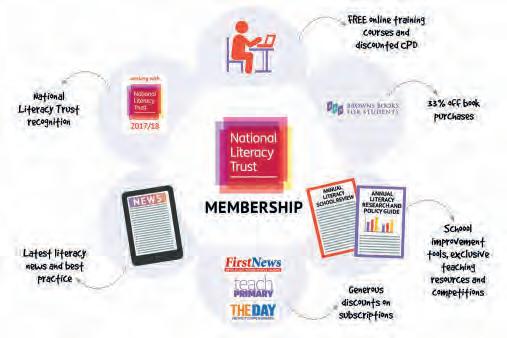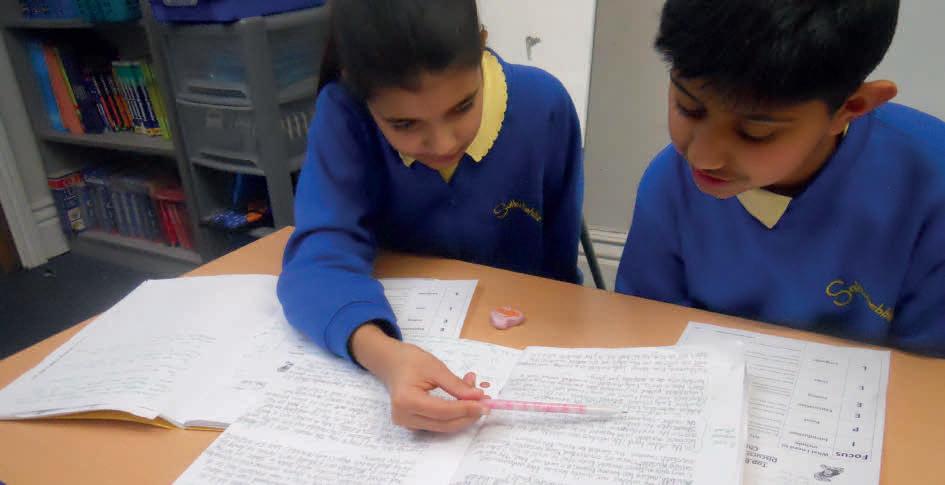
4 minute read
IPEELL: What is it?
The IPEELL strategy
The IPEELL strategy uses memorable experiences, positive attitudes and SelfRegulated Strategy Development (SRSD) to improve pupils’ writing. The main advantages of the IPEELL approach are: ■ It works with existing teaching methods and doesn’t require expensive additional resources ■ It is a class-based approach that can work for children of all abilities ■ It works with most text types ■ It provides a focus for writing and a structure to help organise pupils’ writing ■ It provides a method for pupils to evaluate their own work and set goals for improvement Most importantly, IPEELL involves pupils taking ownership of the writing process through self-motivation, self-evaluation and setting goals for self-improvement.
Memorable experiences


All too often, children are asked to write about things they know little about and haven’t experienced so writing is even harder than it needs to be. It is hard to believe that an 11-year-old child might never have been to the seaside or a place of historical interest but this is often the case, especially for children from disadvantaged backgrounds. For these children, it is essential that schools provide stimulating and memorable experiences that provide a focus for learning.
It is difficult to be prescriptive about the nature of such experiences as schools and teachers have different strengths and interests. However, memorable experiences could include: ■ Residential visits


■ Off-site visits linked with topic themes ■ Visitors to the school linked with themes ■ Authors in the school
■ Arts, theatre and music groups ■ Outdoor activities – especially team-building pursuits and treasure hunts

■ Community walks to take a new look at local features ■ Use of film ■ Special ‘staged’ events such as the arrival of a mystery package, or the discovery of something unusual like a crime scene in the school grounds


The important aspect of all these experiences is considering the variety of writing activities they make possible. A single memorable learning experience can provide the stimulus to write for real audiences and for specific purposes. When pupils are aware their writing will not have a readership beyond their teacher, they may be reluctant to write a piece that seemingly has no purpose, achieves nothing and will only live in the pages of their literacy book. Sometimes the opportunities that arise are not always those that were planned. At one school where the return trip from London went wrong, the experience was the perfect platform for letters of complaint to the company that had cancelled their train.
Self-Regulated Strategy Development (SRSD)
SRSD is a strategy (originating in North America) that provides a clear structure to assist writers and can be used with most text types, including narrative. It has been used for over 20 years – mainly in America – and has been the subject of considerable research. SRSD provides students with effective strategies to become confident and successful writers through the development of self-regulation and six basic stages of instruction. This provides pupils with increased ownership for improving their writing. IPEELL uses the key principles of SRSD but with significant variations to reflect the requirements of the English National Curriculum and best practices in teaching for Key Stages 2 and 3.
Creating positive attitudes to writing
This is a very important part of the IPEELL strategy. Sometimes they are called ‘motivational messages’ and their main purpose is to develop positive attitudes towards the writing process. This approach is used successfully in a wide range of contexts, especially in sporting activities.
Secret sheet: Andy Murray’s motivational slogans have been revealed by a fan at the Rotterdam Open.

“Be good to yourself”, “Try your best” and “Focus on the process.” They might sound like the kind of motivational slogans so beloved by marketing managers and life coaches the world over, but they are actually the words used by Andy Murray to inspire himself. The British No. 1 has started to write down key phrases and tactical reminders on a sheet of paper, which he then reads at important moments in matches. Daily Telegraph, 18 February 2015.
Pupils should be encouraged to create their own positive messages and refer to them regularly when undertaking writing tasks. The messages should be constantly available and not tucked away in an exercise book never to be seen again. They are most effective when teachers remind children about them often and revisit the notion on a half-termly basis or even more regularly. Pupils can be asked to research motivational messages used by their sporting heroes or by popular authors and discuss how these can have an impact on their approach to writing.









